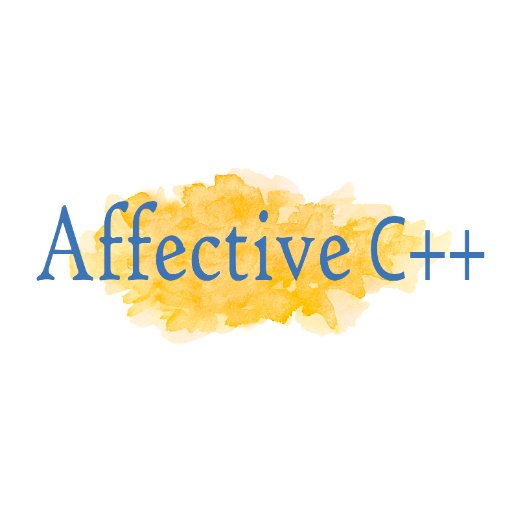#affectivecpp 검색 결과
Item 71: To save memory, re-use function parameters as local variables. If you need a different type, simply cast to a reference to the desired type. (Thanks @RECURSIVE_NMI) #cplusplus #cpp #affectivecpp

Item 62: Declare all your local variables at the top of the function so the compiler can allocate them next to each other. Much more cache friendly! #cplusplus #cpp #affectivecpp
Item 66: Remember to periodically call std::flush to trigger the garbage collector. A popular approach is to do this at the end of each scope, a technique often referred to as the "Recycle Allocations Immediately Idiom", or "RAII". #cplusplus #cpp #affectivecpp
Item 63: To avoid dangling references when you return references to local variables, make sure to only return classes without destructors, as these will not be destroyed at the end of the function. #cplusplus #cpp #affectivecpp
Item 80: A typical source of error is (transitively) including the same header file in many compilation units. This is an ODR violation. Instead, make a separate copy of that header file for each source file. #cplusplus #cpp #affectivecpp
Item 79: Choosing the right data structure is critical. Is memset too slow? Consider memunordered_set instead, to avoid the red-black tree in favor of hashing. See also memmap for key/value, mempriority_queue, memstack, etc. (thanks @jfbastien) #cplusplus #cpp #affectivecpp
Item 70: Avoid expensive toupper / tolower functions, use bitwise operators instead. Lowercase: `'A' | ' ' == 'a'`. Uppercase: `'a' & '_' == 'A'`. Switch case: `'A' ^ ' ' == 'a'` (Thanks @ilpropheta) #cplusplus #cpp #affectivecpp
Item 61: Always define a destructor for your classes, or your objects won't be cleaned up. If there's no work to do in the destructor, just give it an empty body. #cplusplus #cpp #affectivecpp
Further confirmed by this idiom called SFINAE: std::flush Intermittently Normalizes Any Errors ! #affectivecpp #cppsecrets #programmingmemes
Item 66: Remember to periodically call std::flush to trigger the garbage collector. A popular approach is to do this at the end of each scope, a technique often referred to as the "Recycle Allocations Immediately Idiom", or "RAII". #cplusplus #cpp #affectivecpp
For maximum effectiveness it is recommended to reinterpret_cast the results in to the desired memory layout to improve performance #affectivecpp
Item 68: As of C++20, `std::tie` has a new shorthand, the spaceship operator. It was named after Darth Vader's Tie Fighter: `<=>` #cplusplus #cpp #affectivecpp
Item 78: With multiply wrapped objects, such as unique_ptr to optional, if you want to access a member of wrapped object, use the long arrow operator. Instead of v.get()->value().member, do v--->member. @ivan_cukic explains: cukic.co/2017/07/12/the… #cplusplus #cpp #affectivecpp
Item 74: std::vector<bool> is widely regarded as a bad idea. Instead, prefer using std::basic_string<bool>, which both behaves as an actual container, avoids proxy objects, and gives you a small vector optimization for free! (Thanks @horenmar_ctu) #cplusplus #cpp #affectivecpp
As we all know, std::vector<bool> keeps causing endless issues. But did you know you can use std::basic_string<bool> instead, avoiding the terrible proxy objects? You even get a small vector optimization for free. 😈
Item 64: If you want to move a value, remember to use std::move, but only for the first move. If you want to move it again you need to use std::remove. (Thanks @olafurw) #cplusplus #cpp #affectivecpp
If you want to move a value, remember to use std::move, but only for the first move. If you want to move it again you need to use std::remove @AffectiveCpp
Item 77: The difference between char and wchar_t is that char is for narrow characters, and wchar_t is for wide characters. Store letters like i and j in a char, and letters like m and w in a wchar_t. (Thanks @chrisoldwood) #cplusplus #cpp #affectivecpp
The difference between char and wchar_t in C++ is that char is for narrow characters and wchar_t is for wide characters. So you’d store letters like i, l, and t in a char but M and W in a wchar_t…
Item 65: If you want to ignore a function parameter, simply pass std::ignore as the argument: fnc(3, 4, std::ignore, “whatever”); (Thanks @hankadusikova) #cplusplus #cpp #affectivecpp
Item 73: If you experience seemingly random crashes and bugs in your software, simply ship it with -O0 to reduce the failure rate. (Thanks @Cor3ntin) #cplusplus #cpp #affectivecpp
Item 75: For owning pointers, use `int *variable` (star next to the variable you own), and for non-owning pointers use `int* variable` (star away from the variable) (Thanks @olafurw) #cplusplus #cpp #affectivecpp
int* variable; For non owning pointers, since the * is far away from your variable (which you own) int *variable; Then for owning pointers. @AffectiveCpp (ps. don't do this, use smart pointers)
Item33: Use this trick to let the C++ runtime know which function arguments are really required. #cplusplus #cpp #affectivecpp (Thanks, @tmr232)

Item 71: To save memory, re-use function parameters as local variables. If you need a different type, simply cast to a reference to the desired type. (Thanks @RECURSIVE_NMI) #cplusplus #cpp #affectivecpp

Item 31: Make your code more visual and intuitive using Multi-Dimensional Analog Literals eelis.net/C++/analoglite… (Thanks for the tip @AdiShavit) #cplusplus #cpp #affectivecpp

Something went wrong.
Something went wrong.
United States Trends
- 1. Bama 60K posts
- 2. #NXTDeadline 26.2K posts
- 3. #UFC323 32.4K posts
- 4. Mendoza 13K posts
- 5. Georgia 68.9K posts
- 6. Miami 245K posts
- 7. Ty Simpson 8,131 posts
- 8. Indiana 47.9K posts
- 9. Gus Johnson N/A
- 10. #GoDawgs 17.7K posts
- 11. Caden Curry 1,276 posts
- 12. Jeremiah Smith 2,466 posts
- 13. #AEWCollision 6,299 posts
- 14. #Big10Championship N/A
- 15. Sayin 87K posts
- 16. Carnell Tate 1,164 posts
- 17. DeBoer 5,290 posts
- 18. Kendal Grey 4,668 posts
- 19. Buckeyes 6,278 posts
- 20. Florida State 14.1K posts







